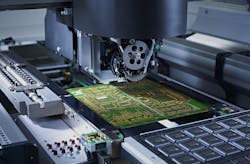Tempo Automation Takes Circuit Board Assembly Small-Scale
Manufacturing was not always the plan for Tempo Automation, a five-year-old circuit board assembly company. Before building its 8,000-square-foot factory in San Francisco, the company focused on making a smaller, faster and cheaper PCB assembly machine. The contraption would cost $10,000, or about one percent of a traditional model.
That project never came off, so the company switched gears into manufacturing, hoping to make it easier for hardware companies to prototype circuit boards and evaluate them before moving on to high volume production. With its first factory running at capacity, Tempo recently raised $20 million to help fund a new 42,000-square-foot factory in San Francisco.
As the Internet of Things reinvigorates the hardware business, Tempo is trying to combat the sluggishness of traditional circuit board assembly, said Shashank Samala, the company’s co-founder and vice president of product. Tempo, he said, can make prototypes in several days rather than weeks, by cutting out the back-and-forth between customers and manufacturers.
“When developing new software, it would be unimaginable to have to wait weeks and trade tens of phone calls and emails just to see if your code works or not,” said Jeff McAlvay, Tempo’s C.E.O., in a statement. “Yet, that’s the daily experience of electrical engineers today.”
Tempo is trying to lighten that load, Samala said. Potential customers can upload designs into the company’s software tool, which breaks down component costs and provides feedback on the manufacturability of the circuit board. The design file is connected to the robots on the factory floor so that updates can be sent automatically to customers.
With integration to electronics distributors like Digi-Key and Mouser Electronics, Tempo’s software also flags the price and availability of parts that it can order by the next day. The company says that it can deliver customers prototypes in as few as three days. “We save them money by assembling boards in a fraction of the time,” Samala said.
Tempo is also trying to build up the software side of the business, abbreviating assembly by laying out boards and battening down parts automatically. The company’s robots use machine learning software to teach themselves to distinguish between millions of different parts, which helps them place components a little faster and with a little more precision with every order.
Several other companies are trying to tackle small batch manufacturing. Houston, Texas-based Macrofab, which has raised about $5.8 million in venture capital over the last five years, uses software tools similar to Tempo's and can complete certain types of prototype circuit boards in about 10 days. The company has added production manufacturing out of its Tijuana, Mexico-based factory.
Another competitor is San Jose, California-based and Google Ventures-funded Circuit Hub, which matches hardware companies with low cost manufacturers in China. Dragon Innovation, founded by several former iRobot engineering executives, uses software tools to predict production costs, refine products for manufacturing, record bills of materials, and help customers choose factories.
Tempo is staying focused on smaller batches of prototypes. The company’s average order is only about 10 units, and almost all its business is orders under 100 units. Running at full capacity, Tempo’s new factory is expected to produce 75 custom designs and thousands of boards per day, the company said. The company’s order limit is 250 units.
That Tempo is filling a gap in electronics manufacturing shows in its more than two hundred customers in markets like aerospace, automotive and consumer electronics. Though he declined to comment specifically, Samala said that more than half the company’s revenue stems from enterprises. Tempo competes against roughly 1,300 other companies in the circuit board assembly space.
The challenge for Tempo will be converting customers comfortable with signing the same manufacturer for both prototyping and production. “You have this very fragmented industry,” Samala told Electronic Design. “Traditional manufacturers will only take low-volume work because they hope it will turn into high-volume orders in the future.”
Tempo plans to put part of the funding toward doubling its headcount to over 100 employees by 2019. The company – funded by P72 Ventures, existing investors Lux Capital, Uncork Capital and AME, and new investors Dolby Ventures, Industry Ventures and Cendana – also intends to expand its factory workforce, which accounts for about 25 of its 65 current employees. The focus there is on improving production and quality assurance.
“Engineers go to school for engineering, not manufacturing and the supply chain,” Shamala said. “You use a circuit board that is five by five inches versus two by two inches. What does that do to your cost how does that affect what parts you use? They don’t know the manufacturing and supply chain implications of their design decisions.”
That is where Tempo can muscle into the electronics industry, Samala said. “You surface to the engineer all the logistics knowledge you have,” he said.
About the Author
James Morra
Senior Editor
James Morra is the senior editor for Electronic Design, covering the semiconductor industry and new technology trends, with a focus on power electronics and power management. He also reports on the business behind electrical engineering, including the electronics supply chain. He joined Electronic Design in 2015 and is based in Chicago, Illinois.

